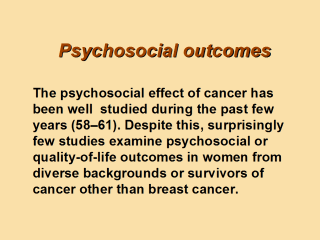| front |1 |2 |3 |4 |5 |6 |7 |8 |9 |10 |11 |12 |13 |14 |15 |16 |17 |18 |19 |20 |21 |22 |23 |24 |25 |26 |27 |28 |29 |30 |31 |review |
 |
Psychosocial and
quality-of-life sequelae incorporate aspects of survivorship relating to
adaptation of the patient to the personal consequences of cancer diagnosis
and treatment (issues of self-concept, body image, personal autonomy, coping
strategies, intimacy, interpersonal and family interactions and living with
uncertainty) and adjustment to the social consequences of cancer (societal
and familial perceptions and expectations; altered interpersonal
relationships, family roles and functions; and issues of financial
stability, jobsecurity, health insurance, job lock or discrimination)
(30,62).
Persons who have cancer experience the effect of the disease in many different ways and at different times. These issues in turn exert an effect on perceived quality of life and contribute to the meaning of cancer for the patient. The personís age and the degree to which the disease and treatment effects threaten life goals and activities modify the meaning of cancer for an individual. At any age, disruption of function, even when temporary, becomes disturbing if it involves valued life activities or forces a change in goals (30,58). |